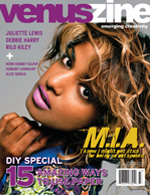VENUS
magazine


August 2007
Fugazi for your coffee table
Photographer Glen E. Friedman releases Keep Your Eyes Open, a retrospective of 20 years shooting Fugazi
by Melody Caraballo
Twenty years to the day of Fugazi’s first concert — and his first photos of the band — the ideological subculture photographer Glen E. Friedman is releasing his book Keep Your Eyes Open through his independent press, Burning Flags. More than coffee-table fare, this photographic retrospective of the inimitable demigods of DIY captures an iconic band through the lens of a skilled and passionate artisan. Friedman’s work transcends run-of-the-mill concert photography, where the viewer feels like a mere onlooker, by actually involving the viewer: the action photography draws the eye from stage to guitar to audience to nature, and the portraiture creates an intimacy hardly rivaled in this genre.
Friedman’s wide-angle close-ups, unconventional perspectives, and, later, exclusive use of natural light make his work not only distinguishable but also revealing — of both himself as an artist and the band. His admiration for Ian MacKaye, Guy Picciotto, Joe Lally, and Brendan Canty resonates throughout the entire body of work, from the candids during sound check to the sea of fans lit by sunset and his uncanny ability to portray the elusive qualities of the communal energy that manifests at a Fugazi show. “I felt [Fugazi] deserved it. Like it’s my personal responsibility to actually make it something different, to make it something special,” he explains. From the first pages, it’s evident that Friedman aimed to convey his story of the seminal band as a fan first and a photographer second.
Friedman and MacKaye met at a Bad Brains show in 1981, but after hearing Minor Threat’s In My Eyes seven-inch, Friedman was compelled by the “phenomenal fucking incredible record” to write a letter to MacKaye. They’ve been a part of each other’s lives ever since. “They’re nice guys. They’re all gentleman. The best people I know. Ian was the best man in my wedding,” Friedman says. But this is no case of nepotism or nostalgia. Friedman, some 26 years later, seems genuinely excited about the impact Fugazi had and can still have. Instead of letting this catalogue of work collect any more dust on a shelf in his closet, Friedman said he felt that the pictorial could be inspiring to people. “I see a void in the culture where a band like this is still needed and still deserves to be appreciated and looked up to.” This is, after all, a band that actually has principles — tackling women’s rights in “Reclamation” and consumerism in “Merchandise” — from which it did not waver, no matter the contracts on the table. “Their music to this day, I think, stands up and certainly their business ethic is like no one you’ve encountered before ever in the music industry.” Friedman goes on to say, “People have turned down big deals or done their business in certain ways, but they haven’t had the opportunities Fugazi has, they haven’t been successful on their own terms the way they have. People can say, 'Oh, I don’t want to sign to a major label' — well, that’s because no major label has asked you yet, but if they did, you probably would.”
So, like Friedman says, it really is all about composition, in respect to both the dynamic arrangements within his photographs as well as the qualitative makeup of his subjects. The synergy of the two in this pictorial creates a tangible affect that is at once art and homage. “The things about Fugazi that I think can speak universally to those who have an open mind are the way they make their art, their music, the way they run their business, and the way they conduct their personal lives,” he says. “I don’t know what more else there is to life than those three things, but basically everything they do is very inspiring.”
As the epitome of independent, Fugazi handled all aspects of their band and didn’t let any outside influences confuse their message. “With these guys, they talk the talk and walk the walk, it’s pretty rare,” Friedman says — after speaking with him, it’s apparent that he too is of this distinctive breed. He says of his art, “It’s from the heart, things that I believe in, things that inspire me. I really truly feel like it’s a personal responsibility to share that inspiration with other people, and I work really hard at it.” It shows.
If you weren’t ever fortunate enough to have attended one of Fugazi’s $5 shows, Keep Your Eyes Open succeeds in placing you in the audience. For those who did experience the moral aesthetes live, the photos take you right on stage. More importantly, Friedman accomplishes this with clear moral and artistic values. “I knew I had to do something to make people feel it the way I did and to make the imagery undeniable to the point where you have to appreciate what the fuck is going on here,” he says. “That’s always been my goal, in all of my photography, all my life. Sometimes I achieve, it sometimes I don’t. But I always go for it, that’s all you can do.”
—
ABOUT THE BOOK:
Keep Your Eyes Open (Burning Flags)
By Glen Friedman
112 pages
$30.00
Order online at fugazibook.com